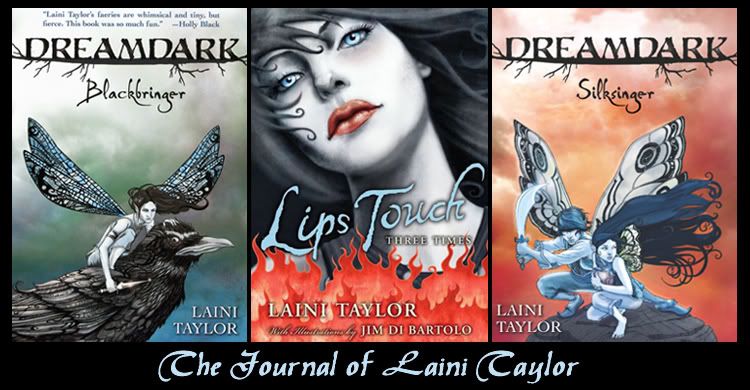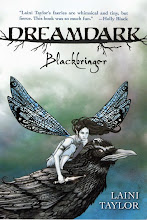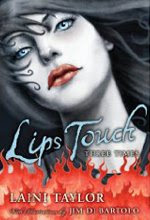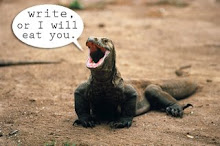 I have been looking forward to The Golden Compass film for several years now. I was not filled with terror that it would be awful. I was anticipating it like a kid anticipates Christmas morning, thinking they might not get everything they want, but pretty positive it will be awesome.
I have been looking forward to The Golden Compass film for several years now. I was not filled with terror that it would be awful. I was anticipating it like a kid anticipates Christmas morning, thinking they might not get everything they want, but pretty positive it will be awesome.It was not awesome.
Now that my grief has subsided, I’m [almost] glad it was not awesome, because it creates a perfect case study of good storytelling vs. bad storytelling.
It shows how two people can take the exact same story elements and one of them (Pullman) can craft them into something compelling and heartbreaking and filled with suspense, and the other (Weitz) can rob them of all drama and meaning, make you not care at all, and worse, make you not even know what you’re supposed to be caring about.
This is a real opportunity for writers to examine some technical aspects of storytelling. Here’s your mission, should you choose to accept:
1.) Read The Golden Compass
2.) See The Golden Compass
3.) Take mental notes; examine what was done in each case, and how the filmmaker managed to go so horribly horribly astray.
As a writer, you are the god of your book. When someone reads it, they are consenting, for a short time, to let you reach inside their mind and tell them what to care about, what to wonder about, what to fear, what to hope for. You write the story, and in it you are planting suble sign-posts all along the way to guide readers through it, and to make them feel how you wish them to feel, make them wonder what you wish them to wonder, etc. Every step of the way, their feelings are putty in your hands. That’s the contract between writer and reader.
The writer tells the reader what to care about, and then they do their best to make them care. If it’s a good book, this is all so seamless and subtle you never once feel the writer’s hand in your mind, guiding you. If it’s poorly done, you feel yanked around and befuddled, and you don’t care at all what happens -- you might not even understand what it is you’re supposed to care about!
In my opinion, Chris Weitz, the writer/director, failed in this most fundamental way. He did not make it clear what to care about and what to hope for and fear. In the book -- do you remember? The central question was: What are the Gobblers doing to the kids? And each step toward the answer was a layer peeled back to revelation after devastating revelation. And when you finally found out what they were doing. . . It was a heart-breaking -- nay, a heart-shattering scene.
[Spoiler Alert (sort of, but not really)]
When Lyra found that little boy in the shed clutching a dried fish and finally understood what the Gobblers were doing. . . it still gives me chills to think about. In the movie, this moment had no power because you hadn’t been set up to wonder what the Gobblers were doing. It was just this ice adventure with some shadowy villains and vague nefarious things going on, but the reader/viewer’s emotional path through the story was not mapped out by the filmmaker.
This aspect of craft is not something I thought about until I was deep into writing my first novel. I had never really thought about how much of writing is crafting the reader's emotional journey through the pages, how much thought and work goes into making sure they're thinking and feeling just what you want them to, just when you need them to. You have to a) give the reader something clear to care about and hope for; b) conversely, give them a bad alternative to fear. And then there’s c) giving them something to wonder about so they keep turning the pages. What these things are will change over the course of a novel. In The Golden Compass (book), for example, after the revelations at Bolvanger, there are new things that have already been put into place for you to care/wonder about and fear.
When I’m writing, I am asking myself, “Now, in this scene, what do I want the reader to be thinking and wondering and feeling and fearing?” I don’t know how much other writers concsciously think of this -- I am curious about it, though. I would say that in early drafts, I am not thinking it so clearly. It can come fairly late in the writing that I really know myself what the central issues are, and then in revisions I’m trying to sharpen the story to a point, to direct the reader’s mind where I want it to go, hopefully, without them feeling me doing it.
It’s hard -- it’s basically like you’re carrying somebody along in the palm of your hand, trying to make them forget you’re there. I have a lot to learn about it, and many books ahead of me in which to figure out the craft of this. Chris Weitz has a long way to go too.
Man, I could go on and on about this, but I won’t. I just think this is such a brilliant opportunity for writers to see “what to do” vs. “what not to do” -- if I taught writing, I would incorporate this into my curriculum. There are many other examples of that sort of negligence throughout this movie. It kills me, because it was so unnecessary. They had the money for a fabulous cast (I loved Lyra) and gorgeous design; why not get a decent screenplay? That screenplay was AWFUL.
Never ever have I been so painfully conscious of being fed exposition through dialogue. Every exchange between characters felt like being bashed on the head by an exposition hammer. The characters were always saying things they had no way of knowing, just so the film could let the viewers know what they needed to know. AWFUL! I kept thinking, “Now, how did she know that?” when Lyra would make a massive intuitive leap. God, it makes me so MAD.
Oh yeah, and the “golden compass” itself -- it failed to become a crucial element to the plot. Yeah, Lyra used it a few times, but it could have been cut entirely out of the plot and it wouldn’t have mattered at all. The magic and mystery of it, and Lyra’s extraordinary ability to read it: lost. Utterly lost.
And, everything felt so rushed and smashed together. There was no space around the important moments. Just this barrelling forward, trying to get it done. In Fellowship of the Ring, remember the loss of Gandalf? That was so beautifully, perfectly crafted. It’s imprinted in my mind -- the aftermath of it when you’re left in the silent, shocked grief of the characters and you feel like you’re there, and you’re staggering and reeling too. I have a whole new level of appreciation for what Peter Jackson did after seeing The Golden Compass.
What Chris Weitz would have done with The Lord of the Rings, it makes me shudder to think! So, New Line Pictures, you had better get your act together and get Peter Jackson to do The Hobbit. Or I will smite you.









15 comments:
I'm so sorry it is so disappointing - we've been looking forward to it here, too. I finished the book just in time and loved every word of it. It's one of the reasons I read the book first for any movie that comes out - so I can get the REAL story first.
Having a musical score that was completely forgettable also didn't help. These big epics need some seriously stirring original music, not just some lacklustre orchestra fitting in the job between some Enya stint.
This was a great read. My husband and I saw the movie yesterday. He had a chance to re-read the novel this week; I did not, and when I read it, it was, oh, probably 2000. We both thought the movie had problems, but he was way more disappointed, saying specifically that they revealed the answers to too many mysteries way, way up front in the film.
Also -- and, again, it's been a long time since I've read the books -- what I found interesting was how I kept reading about how fans were disappointed that the director (who also wrote the screenplay) had gutted the film of its anti-organized religion theme or whatever you want to call it. Instead, I felt like that was way too heavy-handed. The Magesterium this, the Magesterium that. Authority Is Bad every five minutes. Talk about a hammer. And my husband said that, yeah, they appeared in the movie WAY more than in the book (I wouldn't remember this).
Anyway, thanks for this great write-up! Too bad negotiations with Tom Stoppard fell through; I had read he was going to write the screenplay. That would have been something.
Jules, 7-Imp
Oh, I meant to say re that heavy-handed comment: Another example my husband gave when I told him this (again, I don't remember from the novel) was that the head of the college tried to poison Asriel in the novel, not the guy from The Magesterium (whose name I'm blanking on), who was made to look like, I dunno, a Nazi villain or something. Just too much.
-- Jules
I haven't read the book, but I saw the movie last night. In the end, the movie did make me want to read the book. But that's primarily because I'm a writer and saw a lot of cool things on the screen and knew they would be better explained in the book. All in all, I was very entertained by the movie...but not blown away.
My wife, on the other hand, leaned over halfway through and asked if I wanted to leave.
- Jay
Isn't it interesting when you find a work of art that triggers this sort of clarification of your own ideas about the process and the work, etc? It's happened to me in the oddest of places (bad chick lit, etc). It's unfortunate that it happened to you with a disappointing rendition of a book you love.
On the other hand, we got this post out of it...and I am so grateful for THAT.
Well - here's the upside, I just learned a whole lot about story telling in this post. And I'm about to put that learning to good use as I try to write the story of my two years in Afghanistan in a way that makes the reader care about what is going on.
I've completed part one of the assignment (of course, loved it) and now I am ready to complete part II - maybe they'll have it on the plane on the way home and I can take notes...
Thanks for carying this much about story telling. It is a sacred art in my humble opinion.
My daughter doesn't want to see the movie for this reason. She loves the way the story was told by Pullman and doesn't want it spoiled.
Just FYI, my hubby sent me a BBC link and Jackson is on for the Hobbit movie(s), yes 2 Hobbit movies!
I haven't seen the movie, and, I think will read the book/s instead. I have heard that the movie was bad from other people as well. For another movie that was made from a book, look at Bourne Identity. It has pretty well nothing to do with the book except certain names. The movie was very disapointing. Your exercise would work well for this book too!
Excellent job pin-pointing what was so wrong with the film. I was so bummed that the visual spectacle of the movie was in service to such a plodding, yet rushed, screenplay.
I doubt they make the other two books into films, even with a different director, which is kind of a blessing after seeing this one.
I think you are being unfair to the director/screenplay writer. I didn't enjoy the movie, but didn't come away blaming Weiss. Instead, I thought he did as well as anyone could with an impossible task. I think the book was a bad pick for a movie. There are just too many nuances that are crucial to the story, to the emotional response, and to the emotional manipulation you are talking about. If it was going to go on screen, I wish they'd made a really high quality six or eight part mini-series.
--hope
I was having such a hard time trying to crystallize what my feelings. My husband has not read the books and my girls and I were trying to explain what it was that had disappointed us. You have exactly pinpointed my problem with the movie. It looked wonderful. The acting was excellent but ultimately, I missed the emotional punch of the story.
Your comparison to Fellowship of the Ring is spot on. Thank goodness New Line and Jackson have made up and the Hobbit will go on and Jackson will have a role.
Thank you for your analysis, I agree whole-heartedly. I spent the week after seeing this movie wondering what other movies would be like adapted by Weitz. My Favorite is Star Wars. The first line in the movie would sound like this, "THREEPIO: Did you hear that? They've shut down the main reactor. And by 'they' I mean the Evil Empire... who are bad. Gosh, I sure hope the leader of the Sith, Darth Vador, doesn't us the force to find us. We'll be destroyed for sure. This is madness!"
"THREEPIO: Unless the Force helps us, there'll be no escape for the Princess this time. Unless there was some new hope.. like I heard from a guy that Darth Vador is her Father, she has a twin brother. That means that HE might be able to use the Force!" etc etc
Lesson: The audience doesn't need to know all of the secrets and plot points in the first 10 minutes of a movie!!!
thanks to shar information in the website,after reading i' very like'it
obat benjolan di ketiak kiri dan kanan tradisional
Post a Comment